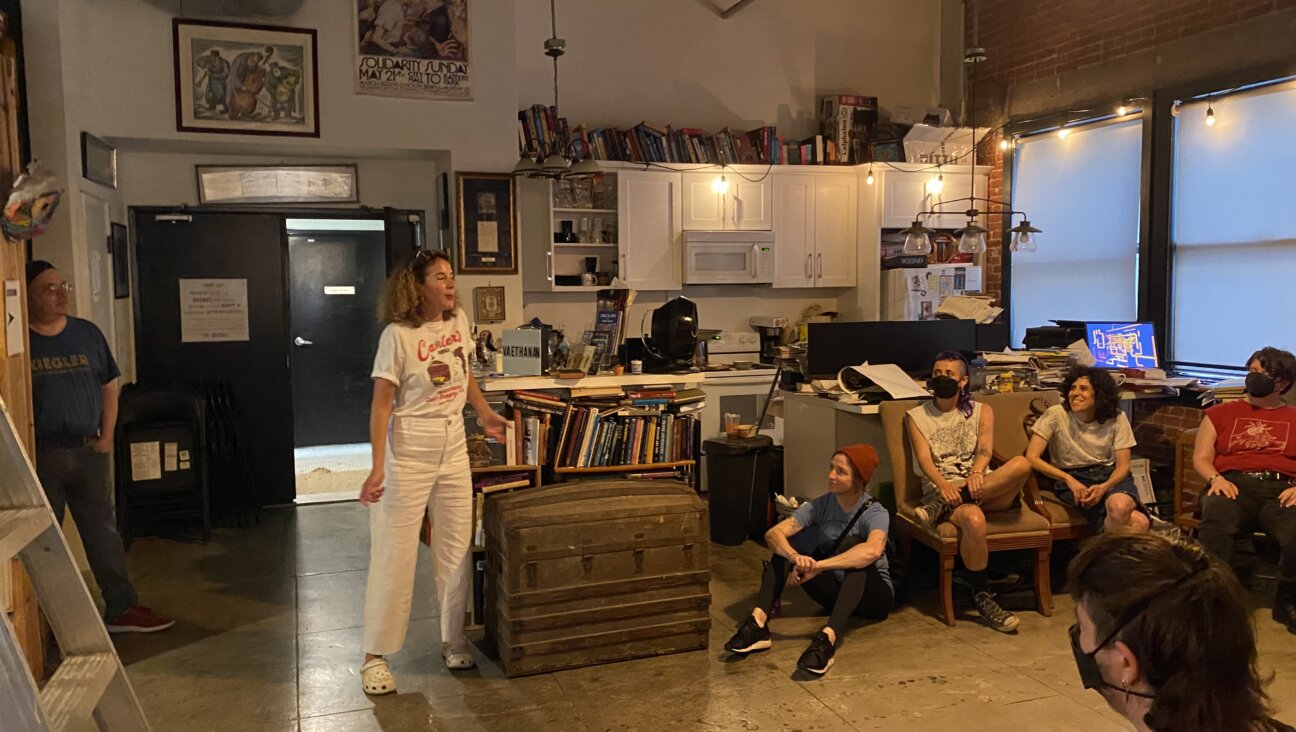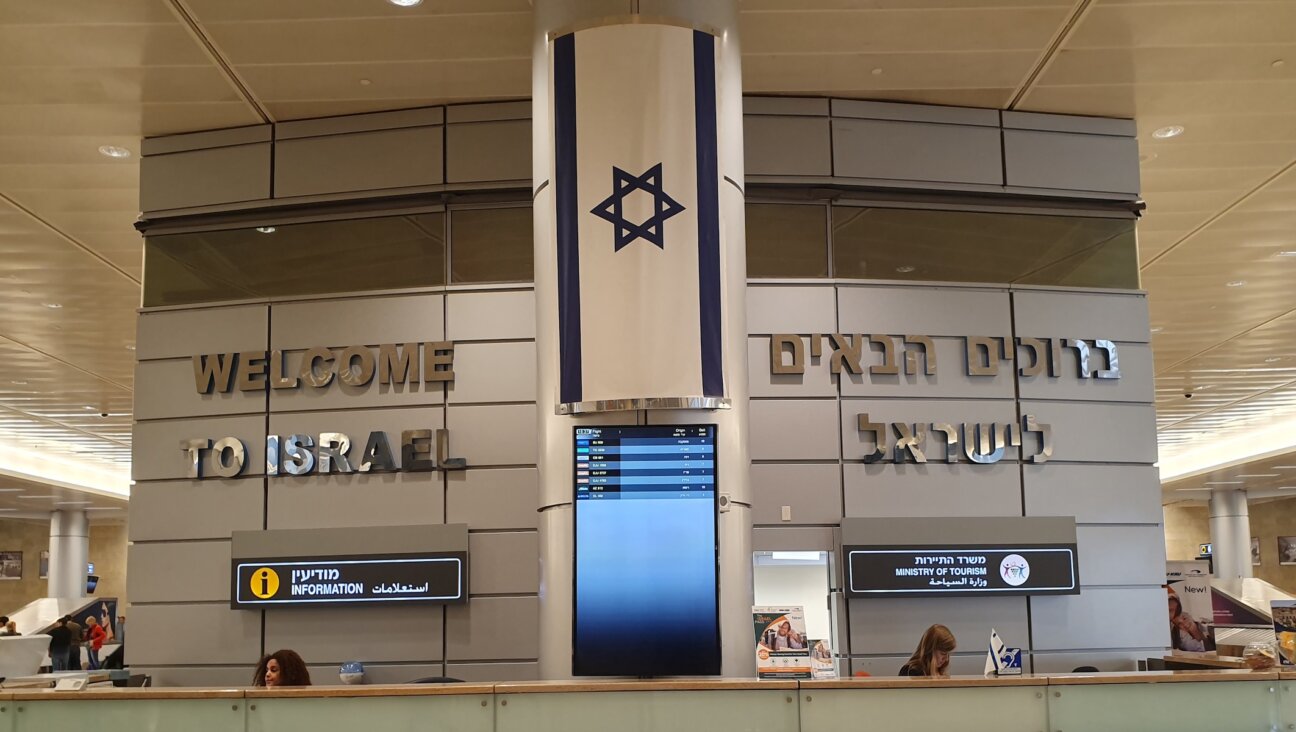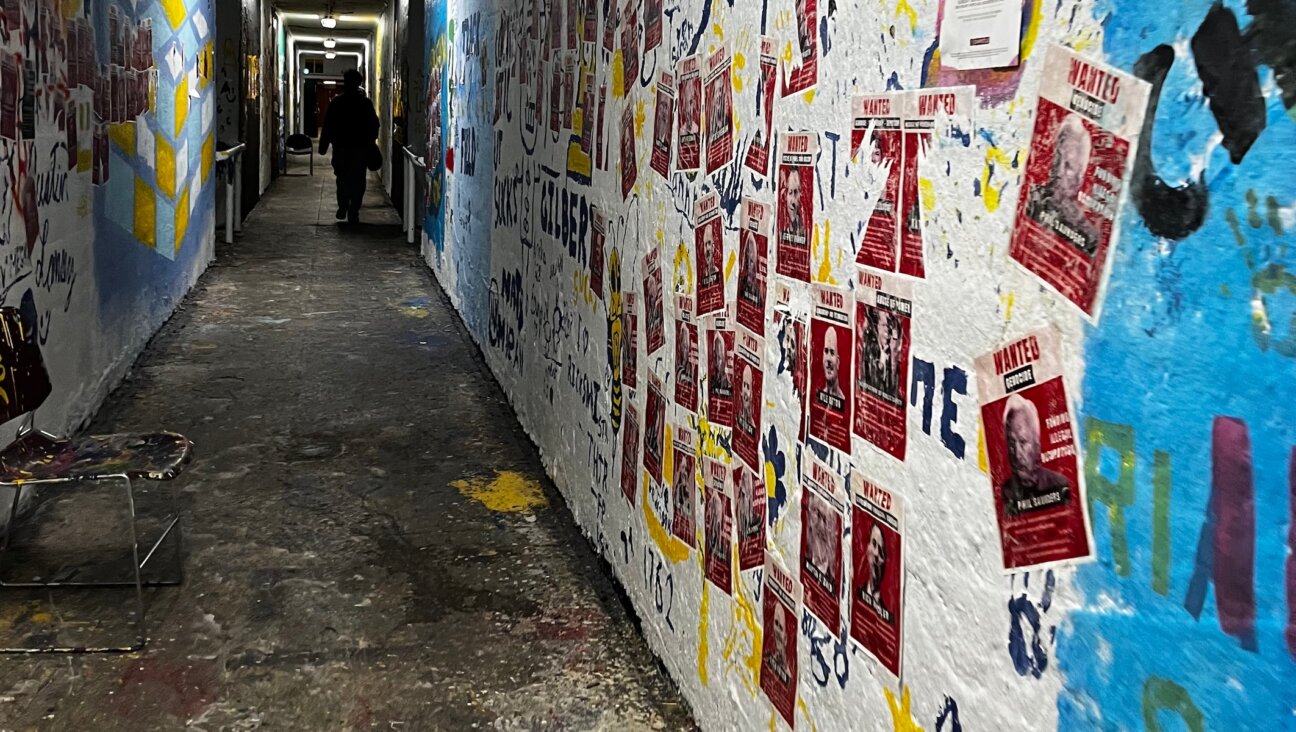‘The Accidental Empire’
‘We are divided,” Haim Gouri’s mother had taught him, “between those with meager spirits and those with torn souls.” That night, more than ever, Gouri counted himself as one of the raggedly ripped souls, and he envied the other sort.
A solitary Israeli army jeep growled north from Jerusalem on the road winding through the dark hills of the West Bank. A soldier drove, another carried a gun to protect Gouri and his wife, Aliza, who had insisted on coming along though she could not understand how he had thrust himself into this madness.
The moon, only a narrow crescent, an accidental pencil stroke of light on the December sky, had already set when the jeep pulled out of its Jerusalem base near midnight. They rode through Ramallah and past the shadowed Arab villages strung out along the mountain ridge, and on through Nablus, where by daylight Palestinian demonstrators had littered the road with burning tires, and headed on. Yitzhak Rabin, the prime minister, had insisted that Gouri — a poet and journalist turned negotiator on a moment’s whim — could not go this way at night in his own car to carry a message from the government.
Fifty-two-years-old, Gouri had a face made of sharp angles: sharp chin and nose, sharp brows above deep-set eyes. Eight and a half years before, on the third day of the Six-Day War of 1967, he had worn a uniform himself as he drove north in a convoy from Jerusalem toward newly conquered Ramallah, a platoon commander in the reserves called up for duty in a sudden conflict. That time, a June sun had drenched the hills. The land he passed through had been part of the British-ruled Palestine of his youth, but had lain, unreachable, beyond the frontier since Israel’s establishment in 1948. “It seemed to me I’d died and was waking up, resurrected,” he had written in June 1967. “All that I loved was cast at my feet, stunningly ownerless, landscapes revealed as in a dream. The old Land of Israel, the homeland of my youth, the other half of my cleft country. And their land, the land of the unseen ones, hiding behind their walls.”
The memory still shone, incandescent, whenever he came this way, though he had since concluded that the war had “liberated the land but torn the nation” — deeply dividing Israelis about whether the land taken in the battles against Jordan, Egypt, and Syria was liberated or occupied, about whether Israel must hold some or all or none of it, about how to see the “unseen ones” — the Arabs who lived there. On this cold night, Gouri feared the nation was on the verge of brother fighting brother.
North of Nablus, next to the village of Sebastia, the jeep turned onto a dirt road lined with pines and cypresses. A two-story stone building, an abandoned train station at which passengers had last alighted when the British ruled Palestine, overlooked a narrow valley splotched with the glow of campfires.
“The scene was surrealistic,” Gouri would recall. Thousands of people waited in freezing cold. Most were Orthodox Jews, young men and women and teenagers, the armies of the night, camped out here in defiance of Rabin’s government, aflame themselves with the passion of demonstrators anywhere who are many and certain. They were there demanding that Rabin allow Jews to settle on the outskirts of Nablus, to stake a claim that would keep Israel from giving up part of the ancient homeland in return for peace. They sought to shatter a policy that said the hill country should be set aside, to be conceded when the time came, in order to avoid permanent Israeli rule over its Arab population. For a week, the crowd in the valley had grown and shrunk and grown, tense with the possibility of confrontation and the improbable hope of victory. Around them waited soldiers, ready for orders to pull them, struggling, onto buses and — as Gouri noticed with sardonic fury — meanwhile protecting the law-defying settlement supporters from the Palestinians demonstrating against their presence.
Gouri had come earlier that day as a journalist, to look and write. The would-be settlers conjured up passions he remembered from his own days in a socialist youth movement intoxicated with the land; and they conjured up fear of anarchy, the collapse of the state.
“Happy are the whole, and woe to the torn…” he wrote that week, describing his visit. “In my life, too, there have been times when I’ve been at one with a deed. Today, too, I’m utterly at one with a few principles. But this time I wander torn among people swept up in messianic fervor.” He wanted this confrontation to end peacefully, within the rules; he feared the shock waves in a fractured nation if one pregnant woman were to miscarry as she was pulled to the buses. So he had stepped out of the role of journalistic witness and into the role of actor, proposing a compromise — to his old comrades-in-arms who now ruled the country, and now, with their approval, the handwritten terms scrawled by a senior cabinet minister, to the organizers at Sebastia. Inside the train station, the leaders of the Gush Emunim, Israel’s most successful protest movement, argued through the night about whether Gouri’s compromise meant victory, as Gouri and his wife shivered outside.
In the uncertain memory of many Israelis and Israel-watchers, the issue of settlement in occupied land began in the struggle between Yitzhak Rabin’s first government in the mid-1970s and the young radicals of Gush Emunim. The story therefore becomes a simple one: On one side are the secular pragmatists of the left; on the other, the religious fanatics of the right. Or — in another telling that changes the labels without drastically changing the script — on one side are uninspired defeatists; on the other, the truest patriots.
In either telling, the confrontation at the Sebastia train station in the first week of December 1975 marks the point of departure for a long and contentious journey. Gush Emunim and its successors have gone
on to build communities throughout the territories Israel overran in June 1967. Settlers have benefited from government support, especially after Israel’s Labor Party lost power to the right-wing Likud bloc in 1977 — and yet, again and again, some have also clashed with the state, at times violently. The question of whether the settlement imperative or democracy takes precedence has threatened to rip Israel apart.
In accounts of Mideast diplomacy as well, the settlements first appear in the mid-1970s, as if from nowhere, with no explanation of how they appear on the landscape. Since then, Israel’s settlements have seized an ever more prominent place on the international agenda. The most accepted approach to ending the entanglement of Israelis and Palestinians requires dividing the land that both consider their home. And the very purpose of settlements is to stand in the way of Israel forfeiting the land it took in 1967, or at the very least, to ensure that it will retain as much of that land as possible.
In his eighties, one of the most renowned poets in a country where poets achieve popular stardom, Haim Gouri says today that getting involved at Sebastia was “the greatest foolishness of my life.” His hope that a compromise would restore “the rules of the game” of civil discourse and law has proven vain. Long after Sebastia, he has watched Israeli soldiers struggle with defiant settlers. He has been accused, he says with pain, of being “the father of the settlements,” as if he will be remembered for that and his poems will be forgotten. The charge is unjust, and not only because he was badly used at the time, his compromise quickly twisted by politicians — particularly by Rabin’s defense minister and chief rival, who was then known for his pro-settlement views, Shimon Peres.
In fact, Sebastia was not the beginning of settlement, but the end of the beginning. It was the culmination of a story that began even before the guns of the Six-Day War cooled. Religious radicals, convinced they were fulfilling God’s plan for history, indeed played a central role — but alongside of, or even as understudies to, secularists identified with Israel’s political left. Some had torn souls. Some were certain of what they were doing, were “made of exclamation points,” in Gouri’s phrase. Without intending to do so, they helped beget the religious settler movement, and then were stunned by it.
There are ironies inside ironies. Those who began the process of settlement beyond Israel’s prewar borders believed passionately in the Jewish state. The older ones had helped create it. Yet they were inspired by the glory of their youth, the fervor of times before the state existed, when they were rebels, not officials. Now, impossibly, they tried to play both roles. The victory of 1967 represented a triumph of the state they had built. Yet it also yielded unplanned conquests, an accidental empire.
The process of settlement, of taking ownership of that empire, led to the state’s gradual unraveling, blurring its borders, undercutting its authority. It pulled Jews and Arabs back into an older kind of conflict — instead of a battle between states, one of the two ethnic groups struggling for control of the same undivided land — the conflict that existed before the partition of Palestine and Israel’s establishment. Victory faded into a tragedy of unending struggles, internal and external.
Sebastia was a crossroads, but the journey had begun years earlier, before anyone could drive north on the road from Jerusalem.
This article is excerpted from the book “The Accidental Empire: Israel and the Birth of the Settlements, 1967-1977” by Gershom Gorenberg, forthcoming from Times Books, an imprint of Henry Holt and Company LLC. Copyright © 2006 by Gershom Gorenberg.
A message from our CEO & publisher Rachel Fishman Feddersen

I hope you appreciated this article. Before you go, I’d like to ask you to please support the Forward’s award-winning, nonprofit journalism during this critical time.
At a time when other newsrooms are closing or cutting back, the Forward has removed its paywall and invested additional resources to report on the ground from Israel and around the U.S. on the impact of the war, rising antisemitism and polarized discourse.
Readers like you make it all possible. Support our work by becoming a Forward Member and connect with our journalism and your community.
— Rachel Fishman Feddersen, Publisher and CEO























